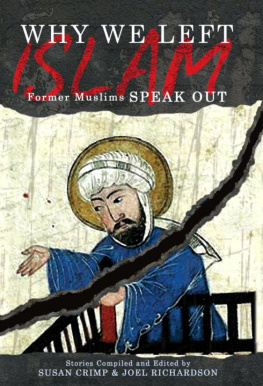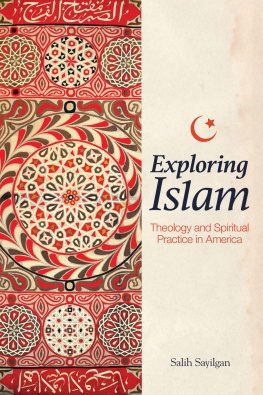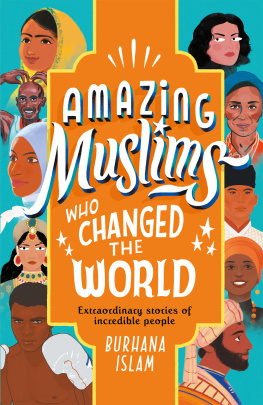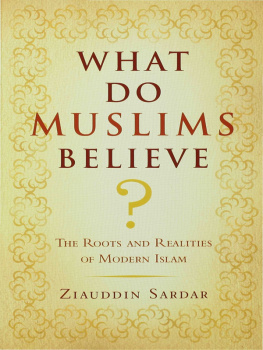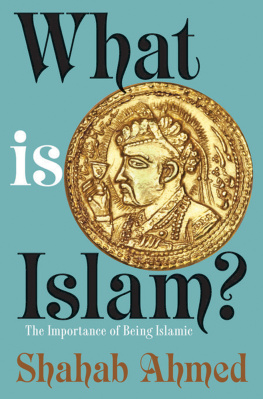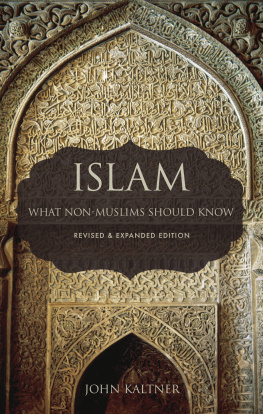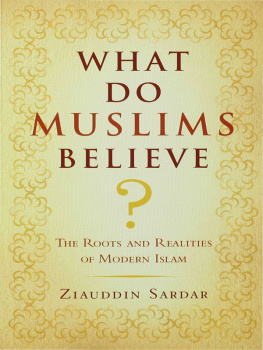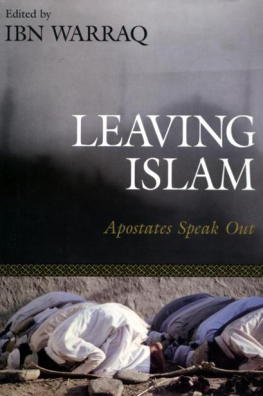Susan Crimp - Why We Left Islam: Former Muslims Speak Out
Here you can read online Susan Crimp - Why We Left Islam: Former Muslims Speak Out full text of the book (entire story) in english for free. Download pdf and epub, get meaning, cover and reviews about this ebook. year: 2008, genre: Religion. Description of the work, (preface) as well as reviews are available. Best literature library LitArk.com created for fans of good reading and offers a wide selection of genres:
Romance novel
Science fiction
Adventure
Detective
Science
History
Home and family
Prose
Art
Politics
Computer
Non-fiction
Religion
Business
Children
Humor
Choose a favorite category and find really read worthwhile books. Enjoy immersion in the world of imagination, feel the emotions of the characters or learn something new for yourself, make an fascinating discovery.
- Book:Why We Left Islam: Former Muslims Speak Out
- Author:
- Genre:
- Year:2008
- Rating:3 / 5
- Favourites:Add to favourites
- Your mark:
- 60
- 1
- 2
- 3
- 4
- 5
Why We Left Islam: Former Muslims Speak Out: summary, description and annotation
We offer to read an annotation, description, summary or preface (depends on what the author of the book "Why We Left Islam: Former Muslims Speak Out" wrote himself). If you haven't found the necessary information about the book — write in the comments, we will try to find it.
Why We Left Islam: Former Muslims Speak Out — read online for free the complete book (whole text) full work
Below is the text of the book, divided by pages. System saving the place of the last page read, allows you to conveniently read the book "Why We Left Islam: Former Muslims Speak Out" online for free, without having to search again every time where you left off. Put a bookmark, and you can go to the page where you finished reading at any time.
Font size:
Interval:
Bookmark:

COMPILED AND EDITED
BY
SUSAN CRIMP
AND
JOEL RICHARDSON

We dedicate this book to the thousands of innocent individuals murdered in the name of Islam-the men and women lost on September 11, 2001, in the Bali and Madrid and London bombings, and in the attacks in India and Pakistan-as well as the countless men and women killed in Iraq and in other attacks throughout the world. (Since September 11, 2001, Islamic terrorists have carried out more than ten thousand deadly terror attacks.)
We dedicate this book also to the innocent schoolchildren barbarically slaughtered in Russia and to Sister Leonella, an elderly Catholic nun who spent a lifetime loving Muslims only to be repaid with a bullet in her back. This book is also written so that the victims of Islamic regimes who endure death by stoning, amputation of limbs for theft, and who live in fear of death because they leave Islam, may not be forgotten. Our intention is that, in reading the collection of stories, the world will clearly hear their cries for justice and their cries for freedom.
"If any religion allows the persecution of the people of different faiths, if any religion keeps women in slavery, if any religion keeps people in ignorance, then I can't accept that religion."1
-Tasmila Nasrin: Physician and Author
"There is no truth on earth but monotheism and following tenets of Islam and there is no way for salvation of mankind but the rule of Islam over mankind. "I
-Iranian President Mahmoud Ahmadinejad
"Even if we were to agree that the vast majority of Muslims are 'moderates' and that, say, only a mere 20 percent of Muslims are 'literalists,' that means that some 250 million Muslims in the world today are dedicated enemies of the infidel West. "3
-Raymond Ibraham
"...on September 11, 2001, I saw the real face of Islam. I saw the happiness on the faces of our people because so many infidels were slaughtered so easily. I was shocked at the gloating of our people for killing innocent kafirs [unbelievers]. I saw many people who started thanking Allah for this massacre. Our Islamic people said that Allah gave us our wish, and that this was the beginning of the destruction of kafir countries. To me, this was sheer inhumanity. Then, the imam implored Allah to help the Taliban against the U.S. military. I was angry. It was then that I stopped praying."4
-Khaled Waleed, Saudi Arabia
PREFACE
ACKNOWLEDGMENTS
XV
Chapter 1
Chapter 19
Chapter 33
Chapter 43
Chapter 47
Chapter 75
Chapter 81
Chapter 85
Chapter 89
Chapter 93
Chapter 97
Chapter 105
Chapter 111
Chapter 113
Chapter 119
Chapter 123
Chapter 133
Chapter 139
Chapter 143
Chapter 147
Chapter 155
Chapter 159
Chapter 163
AFTERWORD
CONTRIBUTORS
NOTES
 EFORE BEGINNING, it is necessary to briefly review some basic facts and terms about Islam and its authority structure. The first and most well-known of Islam's sacred books is of course the Qur'an. The Qur'an may somewhat be viewed as the Bible of Islam in that it is the primary holy book of Islam. The Qur'an was conveyed entirely by Mohammad, the founder and "Prophet" of Islam. The word "Qur'an" means "recitation" or "reading" in Arabic. The book consists of 114 chapters called surahs.
EFORE BEGINNING, it is necessary to briefly review some basic facts and terms about Islam and its authority structure. The first and most well-known of Islam's sacred books is of course the Qur'an. The Qur'an may somewhat be viewed as the Bible of Islam in that it is the primary holy book of Islam. The Qur'an was conveyed entirely by Mohammad, the founder and "Prophet" of Islam. The word "Qur'an" means "recitation" or "reading" in Arabic. The book consists of 114 chapters called surahs.
The Qur'an, however, is not the only source of sacred or even inspired traditions in Islam. For while it is the only Islamic text said to be the literal words of Allah, equally important to all Muslims is the Sunna. Much of the Sunna is found in several collections of traditions known as Hadith. Remember that word, as it will be used much throughout this book. "The Sunna" in Arabic literally means, "a clear or well trodden path." The word refers to whatever Mohammad said, did, condoned, or condemned. It is the record of Mohammad's sayings, customs, teachings, or the example that he left for all Muslims to follow. Muslims view Mohammad as the perfect example for all human beings. This doctrine is spelled out quite clearly in the Qur'an:
If you love Allah, then follow me (Mohammad) Qur'an 3:31 (Shekir)
Whatever Mohammad did or said, therefore, becomes the basis from which to model all life and belief. The Sunna is as important as the Qur'an because it interprets the Qur'an. Without the Sunna, the Qur'an cannot be properly understood. In fact, many aspects and practices of the Islamic religion are not mentioned in the Qur'an but are found only in the Surma. Therefore, the Qur'an and the Surma together form the basis for the beliefs and practices of Muslims everywhere. In this sense, both the Qur'an and the Sunna are believed to be inspired and authoritative. When confronted with some of the more violent or base teachings or practices of Islam, most Muslim apologists will simply ask the question, "Where is that in the Qur'an?" This is a purposeful attempt to mislead the questioner. For, as stated above, whether a teaching is found in the Qur'an or only in the Surma, it is an essential aspect of Islam.
 'HIS BOOK would not be possible without the cooperation of some extremely brave men and women who agreed to share their stories, for which they could face death. As a result, some have chosen to remain anonymous or use pseudonyms to protect themselves. Others included here have even entered the Witness Protection Program. Despite the price that this act of witness demands, they have been brave enough to come forward and tell their stories. While some cannot be thanked by name, their cooperation and courage are beyond commendable.
'HIS BOOK would not be possible without the cooperation of some extremely brave men and women who agreed to share their stories, for which they could face death. As a result, some have chosen to remain anonymous or use pseudonyms to protect themselves. Others included here have even entered the Witness Protection Program. Despite the price that this act of witness demands, they have been brave enough to come forward and tell their stories. While some cannot be thanked by name, their cooperation and courage are beyond commendable.
Special thanks also go to other tireless heroes. Parvin Darabi has worked tirelessly to bring global attention to the problems facing women in the Islamic world. Robert Spencer of Jihad Watch and Jochen Katz of Answering-Islam.org have labored for years correcting fundamentalist propaganda and providing responses and solid answers for searching hearts and minds.
Gratitude is also extended to Maxine Fiel for her contribution, as well as to Mara Einstein for the expertise she offered to help bring this project to fruition. In addition, we thank all of those who have been brave enough to break out of their own personal prisons by standing up to tyranny. Finally, we extend our deepest and most heartfelt gratitude to the memory of those who have made the ultimate sacrifice.
 UE TO THE SUBJECT MATTER of this book, we can already hear the potential cries and chants of "Death to the authors. Death to the editors. Death to the publishers." Indeed, it is sadly true that the simple expression of one of the West's greatest freedoms, namely the freedom of speech, could result in danger to all involved in this project. However, in this time of global Islamofascist terrorism and crippling political correctness, there is too much at stake to capitulate to fear.
UE TO THE SUBJECT MATTER of this book, we can already hear the potential cries and chants of "Death to the authors. Death to the editors. Death to the publishers." Indeed, it is sadly true that the simple expression of one of the West's greatest freedoms, namely the freedom of speech, could result in danger to all involved in this project. However, in this time of global Islamofascist terrorism and crippling political correctness, there is too much at stake to capitulate to fear.
Font size:
Interval:
Bookmark:
Similar books «Why We Left Islam: Former Muslims Speak Out»
Look at similar books to Why We Left Islam: Former Muslims Speak Out. We have selected literature similar in name and meaning in the hope of providing readers with more options to find new, interesting, not yet read works.
Discussion, reviews of the book Why We Left Islam: Former Muslims Speak Out and just readers' own opinions. Leave your comments, write what you think about the work, its meaning or the main characters. Specify what exactly you liked and what you didn't like, and why you think so.

